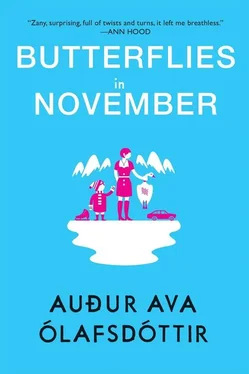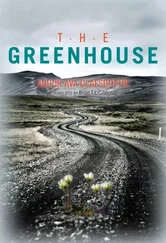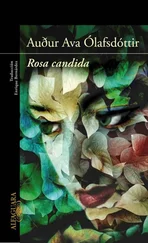While we are queuing in the bank, he examines me for any external signs of change. Even though everything may seem identical on the surface, I am no longer the person he knew and once owned, and pretty soon I’ll be even more different and newer, so new and transformed, in fact, that it may even take me some time to get used to the new me staring back in the mirror. He is looking extremely well, it seems to me, rested, energetic. He’s put on a kilo and a half, by the look of him. I can see now what a good couple we made. We exchange mutual questions about each mother’s health.
“Hi, how’s your mom?”
“Hi, fine, thanks, and how’s your mom?”
“Fine, last I heard. Are you paying bills?”
I can’t tell him that I’m opening two new accounts to deposit my millions and those of my child in care, 22,261,000 krónur each, so I just say:
“No, buying some currency.”
“Are you going on a trip?”
“Yes, you could say that, taking a late summer holiday.”
“Where to?”
I suddenly feel an irrepressible urge to conceal the bungalow from him, the fact that I now have a summer house all to myself, in the same way that he has a woman all to himself. They seem to be of equal value to me at that moment.
In the line in front of me there is a small Asian woman with shiny jet-black hair, holding the hand of a little mixed-race girl.
“South-east Asia probably, Thailand, Burma, Vietnam, Cambodia, Malaysia, Singapore.”
“Wow, will you be gone long?”
“At least six weeks, maybe longer, six months, maybe longer.”
“Wow. .”
To be able to settle my business in peace, I allow a few people to skip me in the queue until he has left the building, climbed into his car and turned the key in the ignition. He looks tired to me now, stressed. He seems to have lost weight. He has bags under his eyes, as if he weren’t sleeping properly. I see now what a poor match we made.
Cashier no. 4 looks at me with a puzzled air when I place the check on the counter in front of her and ask her to split it, by depositing it into two separate bank accounts: 44,523,622 krónur. Then I ask for two million in cash, preferably in thousand-krónur notes. I see no need to leave a trail. Her colleagues at the neighbouring desks slow down their counting.
“That would be 2,000 thousand-krónur notes,” she says reluctantly, twenty wads.
“Yes,” I say, without bothering to recalculate, “that’s right.”
“Just one moment,” she says, because she has to leave her desk, probably to nip into the coffee room at the back to discuss this with her colleagues, after which she’ll have to nip down to the basement to get the wads of cash from the safe. Four of her co-workers check me out with surreptitious glances during her absence.
“It’s best to keep large amounts of cash in nondescript plastic bags, not in a Gucci handbag at any rate,” says the cashier when she returns. “It’ll draw less attention, a used supermarket bag, for example, or library bag,” she says.
As she passes me the bag stuffed with bills through the hole in the glass, she says:
“The branch manager sends you his regards and apologizes for the breadcrumbs, he kept his lunch in that bag.”
I’m not taking much with me. The main thing is to hold onto as little of the old clutter as possible. It’s not that I’m fleeing anything, just exploring my most intimate and uncharted territories in a quest for fresh feelings in a new prefabricated summer cottage planted on the edge of a muddy ravine with my hearing and sight-impaired four-year-old travelling companion. The most important thing is to never look back, to only ever sleep once in the same bed and to solely use the rear-view mirror out of technical necessity and not to gaze into one’s own reflection. Then, when I eventually return, I will have become a new and changed person, by which time my hair will have grown down to my shoulders.
I chuck my things into a bag, but can’t show the same casualness when it comes to packing the boy’s outfits and clothes. Even though I may not be an expert in children or their clothing, I can see quite clearly that he is outgrowing his winter overalls. I buy him a two-piece winter outfit instead, the dearest money can buy, and two pairs of trousers, as well as two new blue eiderdown sleeping bags, one for me and one for my travelling companion. I fetch my flower-embroidered jeans and slip into them.
There’s no point in cramming the car with things; we’ll take a picnic, two bottles of water, some books, two favourite fluffy animals, two favourite pairs of pyjamas and some toys that we choose together, as well as optimism, enthusiasm for travel, several CDs and — last but not least — a glove compartment stuffed with thousand-krónur banknotes. This is the best way to travel without leaving any trail behind us. I guess you could call it a trip without promises, but not without cash — there’s more than plenty of that.
But first I’ve got to return the aftershave to my ex, along with the wedding ring and the sandwich toaster he forgot.
I park my car beside Nína Lind’s Subaru and ring the bell. Their names are already engraved on a plaque beside the bell, his on top of hers, which is more than we ever achieved in our four years, 288 days of marriage.
The boy’s spectacles glisten from the back seat and he watches me intently as I stand on the porch steps in my sweater, holding a co-op carrier bag. It’s Sunday and almost noon when my ex-husband comes to the door in his striped pyjamas. I’d never seen him in pyjamas before. The smell of the apartment also catches me by surprise, a totally new and alien odour.
“Thank you, there was no need to,” he says without looking into the bag, but gazing stiffly into the mid-distance towards the car. The boy’s chin doesn’t reach the window; the only thing that is visible is the top of his woollen hood and eyes.
When I’ve reversed out of the parking space again, my ex is still standing in the doorway in his striped pyjamas watching me, as if he couldn’t quite bring himself to close the door right away.
Without having any precise idea of exactly where I’m going, I start heading east, moving towards an increasingly lower sun and shorter days, and soon find myself driving onto the National Highway No.1—the Ring Road — into the darkness and rain. I don’t even have to choose a direction because on this island there is only one you can choose: the circular road that follows the coastline. In any case, I’m not the type of person who would venture off the highway down some unpaved back road. One doesn’t come across many crossroads on the Ring Road, and even fewer stop signs.
“Yes, of course we’re taking the fish with us.”
You can’t break a promise you’ve made to a child.
We place the three goldfish in the biggest jar that can be found with a lid. The orange creatures jigger nervously with every movement, darting furiously from one wall of the jar to the other, in the little space they have to move in. The sand, pebbles and two shells, which the boy had fetched from his private collection at home and which were supposed to give the jar more of a homely feel, only help to agitate the water even further.
We helped each other lower the jar into the trunk between the two casks of crowberry schnapps and four plants, which we were going to drop off at Mom’s on our way out of town. She had given the plants as gifts to her son-in-law on various occasions, so it seems only natural that she should take care of them now. Everything that dies in my hands always seems to thrive in Mom’s. Although I’m not a bad person, as such, I’m totally inept at looking after things or cultivating them. I simply can’t find the instinct to help things grow. I either seem to water them too late or too much and always when they are on the brink of collapse, whereas in her house everything seems to flourish all around her.
Читать дальше












